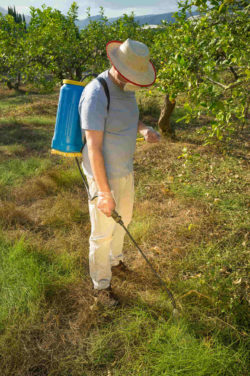Top Class Actions’s website and social media posts use affiliate links. If you make a purchase using such links, we may receive a commission, but it will not result in any additional charges to you. Please review our Affiliate Link Disclosure for more information.

Plaintiff Amos S. says that he sprayed Roundup regularly between 1990 and 2017. He says that the product causes cancer, and because of his use of the product, he developed non-Hodgkin’s lymphoma. Amos claims that because of his lymphoma, he suffered “economic and non-economic damages” including physical injury, pain and suffering, and costs associated with treating his medical condition.
He claims that he developed non-Hodgkin’s lymphoma after using Roundup over a long period of time despite the fact that he allegedly followed all safety guidelines and use instructions associated with the product.
Amos says that Monsanto, the makers of the weedkiller, knew that one of the product’s ingredient, glyphosate, could cause cancer, and continued to use it in the product nonetheless. He also argues that glyphosate, in conjunction with other chemicals in Roundup, is even more dangerous to human health, and carries an even greater risk of causing cancer than glyphosate alone. Allegedly, Monsanto knew that both glyphosate alone, and glyphosate in conjunction with the chemicals in Roundup are dangerous to human health, and actively concealed this information from consumers.
The Roundup glyphosate exposure lawsuit aims to hold Monsanto liable for Amos’s injuries, and claims that the company knowingly misrepresented its product as safe and effective. Allegedly, Amos would not have sprayed Roundup had he known that it could be dangerous to his health.
Amos reports that Roundup has been on the market since 1974, and is one of the most widely-used weedkillers around the world.
Monsanto contends that regulatory authorities and independent experts around the world have reviewed numbers and agree that there is no evidence that glyphosate, the active ingredient in Roundup brand herbicides and other glyphosate-based herbicides, causes cancer, even at very high doses, and that it is not genotoxic.
Additionally, Monsanto reportedly often advertises Roundup as “ practically nontoxic” and “safer than table salt.”
However, Amos says that the World Health Organization found that glyphosate was a “probable carcinogen” in 2015. He argues that as early as the 1980s, the company should have known that the weedkiller was possibly carcinogenic. Amos cites research from the 1980s and 90s that suggests that glyphosate could cause cancer.
In fact, Amos notes that there is a significant history of legal action taken against Monsanto over the issue of Roundup’s alleged ability to cause cancer. He states that in 1996, the New York Attorney General filed a lawsuit against Monanto, alleging that the company had misrepresented Roundup, and in November of that year, the company entered into an agreement with the company that dictated that the company would not advertise Roundup as harmless, safe, or nontoxic.
However, according to the glyphosate exposure lawsuit, Monsanto did not change its advertising in states other than New York, and continued to knowingly misrepresent Roundup as safe for many years, despite significant concern that it was not.
The Monsanto Glyphosate Exposure Lawsuit is Case No. 4:18-cv-01470-JAR, in the U.S. District Court Eastern District of Missouri, Eastern Division.
If you or a loved one developed cancer after using Roundup as a farm worker or home gardener, you may have a legal claim. Legal migrant farm workers may also seek help. Learn more by filling out the form on this page for a FREE case evaluation.
ATTORNEY ADVERTISING
Top Class Actions is a Proud Member of the American Bar Association
LEGAL INFORMATION IS NOT LEGAL ADVICE
Top Class Actions Legal Statement
©2008 – 2024 Top Class Actions® LLC
Various Trademarks held by their respective owners
This website is not intended for viewing or usage by European Union citizens.
Get Help – It’s Free
Join a Free Roundup Cancer Class Action Lawsuit Investigation
For the most up-to-date information on this case, click here.












